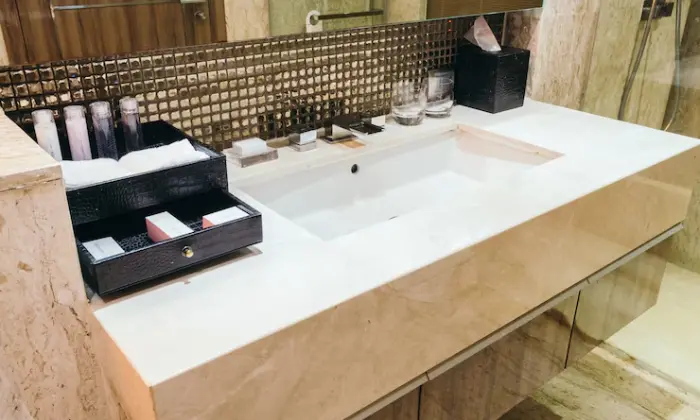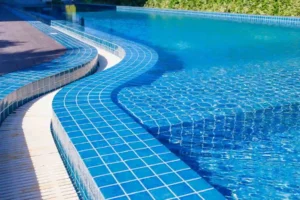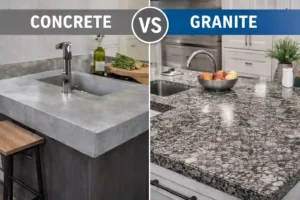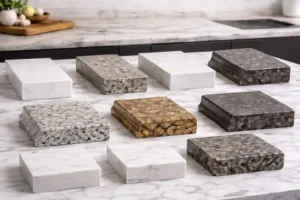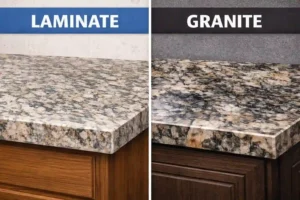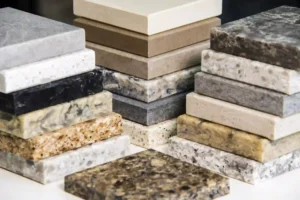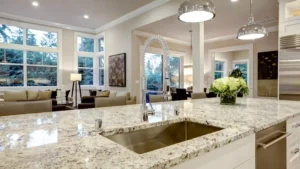When it comes to choosing surfaces for your home, granite has emerged as a favored choice due to its remarkable durability and aesthetic appeal. Among the various finishes available, leathered granite has gained significant popularity for its unique look and practical benefits. In this comprehensive guide, we will delve into what leathered granite is, how it’s made, its cost, its pros and cons, and how to maintain it.
What Is Leathered Granite?
It refers to a specific finish that is applied to natural granite surfaces, giving them a textured, matte appearance. Unlike polished granite, which has a high-gloss sheen, leathered features a soft, tactile surface that retains the natural beauty of the stone. This finish is achieved through a specialized process that enhances the granite’s innate patterns while offering a unique visual and tactile experience.
Leathered granite countertops have become a sought-after option for homeowners and designers alike, particularly for spaces like kitchens and bathrooms, where both style and functionality are paramount. Options like black pearl granit countertops and fantasy brown leathered granite provide stunning choices that can complement various interior design styles.
How Is Leathered Granite Made?
The process of creating leathered stone involves several key steps that transform a raw granite slab into a beautifully finished product. Here’s a breakdown of the process:
Selecting the Granite
The first step involves choosing a high-quality slab of granite. Many homeowners opt for varieties like steel grey leathered granite or fantasy brown granite due to their unique colors and patterns.
Initial Preparation
The granite slab is cut and polished to a honed finish. This step prepares the stone for the leathering process by ensuring a smooth surface.
Leathering Process
A diamond-tipped brush is used to create the leathered texture. This process involves abrading the surface to develop a textured finish that enhances the stone’s natural veining and color variations.
Sealing
After the leathering process is complete, the granite is sealed to ensure it remains stain-resistant and durable. The sealant helps protect against spills and everyday wear, making it ideal for kitchen countertops.
Final Inspection
The finished product is thoroughly inspected to ensure that it meets quality standards before being installed in your home.
This meticulous process results in a unique surface that highlights the beauty of the natural stone while providing a practical finish.
How Much Does Leathered Granite Cost?
The cost of leathered granite can vary based on several factors, including the type of granite, the thickness of the slab, and the complexity of the installation. Generally, leathered stone is priced similarly to other granite finishes, but may be slightly higher due to the additional processing involved.
On average, homeowners can expect to pay between $50 to $100 per square foot for leathered stone countertops, which typically includes the cost of the slab, fabrication, and installation. More exotic stones like black pearl leathered or fantasy brown granite may fall on the higher end of that range due to their unique coloration and rarity.
Pros and Cons of Leathered Granite Countertops
Pros
Aesthetic Appeal
The unique leathered finish provides a sophisticated look that can enhance the overall aesthetic of your kitchen or bathroom. Its textured surface adds depth and character to any space.
Stain Resistance
The sealing process used for leathered stone makes it stain-resistant, making it an excellent choice for kitchen countertops where spills are common.
Durability
Like all granite surfaces, leathered stone is incredibly durable and can withstand heavy use. It is resistant to scratching and heat, making it a practical choice for high-traffic areas.
Low Maintenance
Leathered granite countertops require minimal maintenance compared to other materials. Regular cleaning with mild soap and water is usually sufficient to keep them looking new.
Versatility
With a variety of colors and patterns available, leathered stone can suit a wide range of design styles, from modern to rustic.
Cons
Cost
While leathered countertops offer many benefits, it can be more expensive than other countertop materials. This may be a consideration for budget-conscious homeowners.
Limited Availability
Depending on your location, finding specific types of leathered granite, such as steel grey, may be more challenging than locating standard polished granite.
Texture Consideration
Some individuals may prefer the smooth surface of polished granite over the textured feel of leathered stone. It’s essential to choose based on personal preference.
How Do I Maintain and Care for a Leathered Granite Countertop?
Maintaining leathered stone granite is relatively straightforward, but following a few simple guidelines can help keep your countertops in pristine condition:
Regular Cleaning
Clean your leathered stone surfaces regularly with a mild soap solution and a soft cloth. Avoid abrasive cleaners, as they can damage the sealant and the stone’s surface.
Immediate Spill Cleanup
While leathered stone is stain-resistant, it’s still important to wipe up spills promptly, especially from acidic substances like lemon juice or vinegar, which can dull the finish over time.
Re-sealing
To maintain the stone’s protective barrier, it’s recommended to re-seal your leathered stone countertops every 1 to 2 years, depending on usage. This will help prolong the life of the stone and keep it looking fresh.
Avoid Harsh Chemicals
Steer clear of harsh chemicals, bleach, or ammonia-based cleaners, as these can strip the sealant and damage the stone.
Use Coasters and Cutting Boards
To further protect your countertops, use coasters under glasses and cutting boards when preparing food. This helps prevent scratches and heat damage.
Conclusion
In conclusion, leathered stone granite is an excellent choice for homeowners seeking a unique, durable, and low-maintenance surface. Whether you opt for black pearl, fantasy brown, or steel grey leathered granite, you’ll be investing in a beautiful addition that enhances your home’s value and aesthetic appeal. By understanding its characteristics, maintenance needs, and the installation process, you can confidently choose leathered stone for your next home improvement project.
If you’re looking for quality granite, visit SF Marble Granite at 755 Dutton St, Lowell, MA 01854, or contact us 978-459-5823. Their expert team can help you find the perfect stone for your project.

